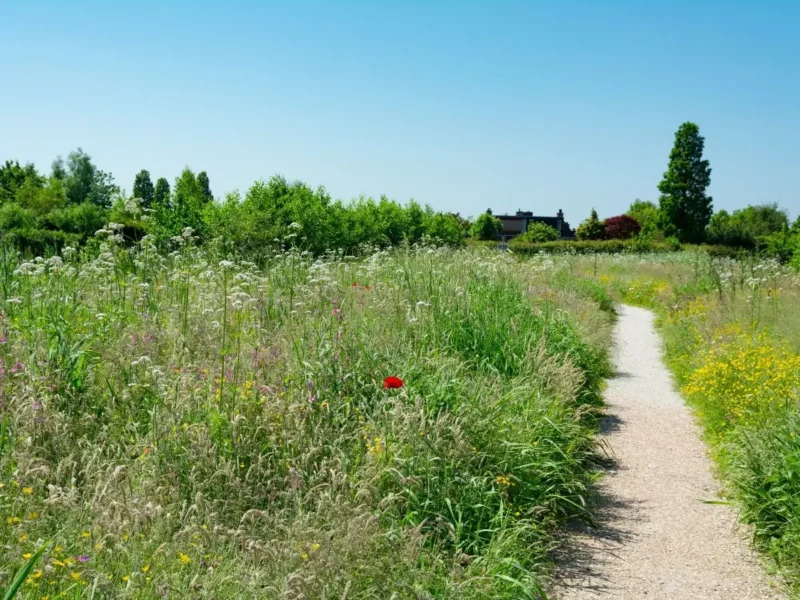Would you like to reinvigorate your garden, see new species, and give nature a boost? All you have to do is…
The conservation charity Plantlife started the “No Mow May” campaign in 2019, to encourage people to give up mowing their lawn for a month to create a home for flowers, bees and other vital pollinators. If you’d rather not let your entire lawn return to a more natural state, Plantlife suggests aiming for a tiered lawn approach, as different lengths of grass will enable short-growing flowers to flourish alongside longer ones.
Reducing the intensity of lawn-mowing can produce some unexpected benefits for the public. In 2019, the British Ecological Society found that reducing the intensity of lawn mowing can lead to increased biodiversity, economic savings, and even the reduced presence of serious allergy-triggering weeds.
Laying off the lawnmower leads to increased biodiversity
Biodiversity refers to the variety of living organisms in a specific area. Routine mowing removes habitats and vastly reduces biodiversity. Only shorter plants survive, which has a knock-on effect on the biodiversity of organisms such as pollinators and herbivores. Less frequent or intensive mowing will enable bees, butterflies and other such wildlife to take up residence in your garden.
Developing and protecting biodiversity is important for many reasons. Research as part of the Plantlife campaign found that simple changes in mowing can result in enough nectar for ten times more bees and other pollinators and their study discovered that over 200 species were found flowering on lawns.
More than 80% of the public supported the idea of councils cutting grass areas less frequently to protect the nation’s bees, according to a survey by Friends of the Earth and Buglife.
Economic benefits
Reducing the intensity of turfgrass maintenance could result in economic savings. If, for example, councils were to mow grass less frequently, it could save in maintenance costs.
Additionally, around 80% of British plants are pollinated by insects and without them it has been suggested that we would risk around £690 million a year in lost crops alone. Pollination is the cause of the plants we see, it feeds our wildlife and provides much of the food that we eat.
Avoiding pest species and allergies
A meta-analysis of 14 studies by the British Ecological Society found that intensive lawn mowing resulted in an increase in the abundance of weeds and lawn pests. One such pest species is ragweed. Scientists say the impact on human health across Europe due to this invasive species may be “seriously underestimated”, according to the BBC. Dr Chris Watson, the lead author of the BES study, cited this as an example of a plant that thrives under intense mowing. Control of the ragweed plant could help to reduce the number of people with allergies and the related healthcare costs; to help with this we can take gradual steps back from intensive lawn maintenance.
Show off your green fingers/ Bragging rights
People who chose not to mow their lawns for No Mow May last year were rewarded with rarer plants, according to The Guardian. More than 250 wild plant species were recorded by gardeners last year, including wild strawberry, wild garlic and very rare plants such as adder’s-tongue fern, and meadow saxifrage. Many orchids were also seen.
Reducing Surface run-off
Due to increased urbanisation and reduced permeable green spaces, heavy rainfall or snow can result in abnormal quantities of water gathering. Having nowhere to go, this run-off ends up polluting rivers and streams after gathering sediment from the ground. Keeping a healthy, thriving lawn can help mitigate this.
Cutting grass short reduces rooting depth, but deep-rooted grass can reduce the erosion of soil. Excess surface run-off and a lack of permeable surfaces also leads to increased flooding. This is a public health and safety issue; flooding endangers human life and exposes the public to pathogenic bacteria. Leaving your grass to grow freely, increasing rooting depth and reducing soil erosion can work to help prevent fostering an environment prone to flooding.
If you are unlikely to consider giving up mowing your lawn just yet, a good compromise is to make sure that for the health and therefore the appearance of the grass, you don’t cut it too short. The shorter the grass is cut, the faster it grows and the more energy is expended on growth instead of repair and the grass is less able to fight off disease and maintain good colour. So a longer lawn may be in your best interests aesthetically!







